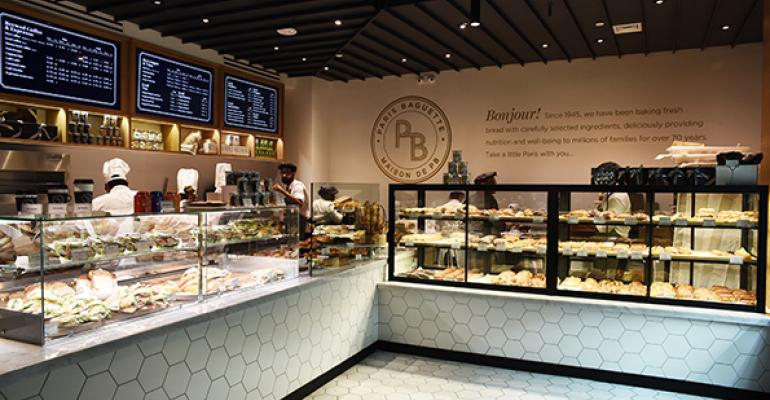Business partners Andrew Pudalov and Buddy Brown hope consumers rushing to get to work will stop at Rush Bowls in west Denver and pick up a breakfast bowl of blended fruit and protein, topped with honey and granola.
Pudalov and Brown recently opened the second location of Rush Bowls, a health oriented, quick service concept Pudalov launched 12 years ago in Boulder, Colorado. The concept's bowls and smoothies do not contain sugar or additives. Fresh fruit is blended with soy, whey or yogurt, and customers can tweak ingredients and toppings to their liking.
With Brown’s experience and expertise — he is a franchisee of 300 Carl’s Jr. and Hardee's restaurants — they’ve begun offering franchises of Rush Bowls.
“Franchising this is a no-brainer,” Brown says. “It’s what people want now — healthy food that takes only a couple of minutes to eat or [for customers] to take on the go and eat while they are walking down the street.”
Breakfast-to-go is more on-trend than ever as breakfast menus continue to contribute to growth in the restaurant industry. Focusing on convenience, fast service and quality is the name of the game for operators making the most of the morning meal.
“We have to make it easy and flawless for the customer,” says Richard Schneider, chief operating officer for the Travel Hospitality Business of Buffalo, New York-based contract foodservice operator, Delaware North.
The travel division manages 300 restaurants and retail stores serving 350 million travelers annually at major airports and travel plazas in the United States, the United Kingdom, Australia and New Zealand.
“Breakfast at all of our airports is extremely important and for most airports it’s the biggest daypart,” he says. “We see breakfast sales continue to grow year after year.”
Travelers are usually in a hurry, so breakfast options must be convenient and easy, but still of good quality, Schneider says. Customers do not want food that has been sitting in a hot box for a long time.
To improve service, Delaware North analyzed customer traffic and flight plans, and adjusted how often and how much of its various items were required, he says. Anything holding for more than 15 minutes gets pulled, although if the operation is doing it right, menu items sell out before their time limit expires.
Many of the airport locations offer hot grab-and-go items, such as burritos or sausage sandwiches or biscuits. Cage-free organic eggs, steel-cut oatmeal and fruit freshly cut up every morning convey the quality customers are seeking, Schneider says. Other operators also stress the importance of keeping grab-and-go items as fresh as possible.
At Paris Baguette stores, croissant sandwiches and pastries are pulled from shelves if they do not sell within a certain time, says Larry Sidoti, chief development officer for the Korean bakery-café chain with more than 3,500 stores in Asia and just under 50 in the United States.
The self-serve cases enable customers to be in and out of the store in two to three minutes, Sidoti says.
“Everything is very fresh,” he says. “Our product is very unique — it’s not as sweet as typical pastries; it’s more light and airy. You don’t feel guilty after you eat this.”
Famous Toastery, a full-service breakfast and lunch concept based in Davidson, North Carolina, plans to include ready-made items to tap into the breakfast convenience demand, says co-founder Robert Maynard.
Four new franchisees will offer hot, ready-to-go bacon, egg and cheese sandwiches, in additions to wraps, salads and freshly squeezed juices with kale, lemon, ginger and apple, Maynard says.
“At the end of the day [grab-and-go] creates a separate revenue stream for the franchisees,” he says.
Speed is important but so is customization, say operators. While grab-and-go is convenient, consumers today still want to customize their food. Using mobile phone apps and online ordering enable operators to offer freshly made-to-order items in minutes.
“You can be parking in the garage at work, get on the phone, order breakfast and walk across the street and find it ready for you,” says Hala Habal, vice president of corporate communications for Dallas-based sandwich shop Which Wich. “It’s nice getting freshly prepared sandwiches where cheese and veggies are sliced fresh, versus getting a processed breakfast product.”
Fast casual concepts can quickly offer custom items to compete with grab-and-go options.
“You can still serve a quality product in three to four minutes, says Carlos Ruggiero, co-founder of Kona USA, the Jersey City, New Jersey-based franchisor of Kono To-Go, formerly known as “The Original” Kono Pizza — the pizza-in-a-cone concept.
“In the U.S. people are always on the go,” says Ruggiero who grew up in Italy. “People want to customize their food. They want it to be healthy and on the go.” According to Chicago marketing research firm Datassential, sandwiches are the leading breakfast menu item for restaurants. More than half of the surveyed restaurants offered some type of breakfast sandwich. Breakfast burritos accounted for a quarter of breakfast menus.
The breakfast taco is also gaining, showing up on 10 percent of menus, a 38 percent increase from four years ago, Datassential reports. Yogurt also is more popular — it is featured on 30 percent of breakfast menus, an 11 percent increase over the past four years.
“Sandwiches are playing a key role in helping restaurants differentiate their breakfast menus,” says Datassential marketing coordinator Joe Garber. “They are easy to customize with unique and premium ingredients like roma tomatoes, Vermont white cheddar and more.”
Pita Pit, the fast casual concept based in Coeur D’Alene, Idaho, has always offered pitas with eggs, sausage and bacon on its menu. But the company plans to heavily market its breakfast items early next year to capitalize on the growth in the breakfast daypart.
“We just launched our 'Fresh Grilled, Flavor Filled' campaign, and it aligns perfectly with breakfast that comes hot off the grill and is custom made,” says Patrick O’Dell, director of brand marketing for Pita Pit. “We are excited for the tie-in to breakfast.”





